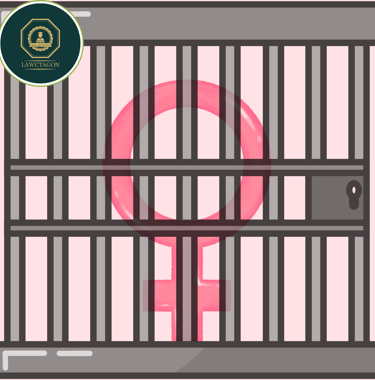Unlocking the challenges of women in prison
In this blog, readers will explore the critical issues faced by women inmates in India, such as staff shortages, custodial abuse, inadequate child facilities, and poor hygiene. It highlights relevant case laws and constitutional rights, and offers solutions like gender-specific services, legal aid education, and vocational training. The blog advocates for reforms to ensure humane treatment and successful reintegration of women inmates into society.
Shreya
6/17/20243 min read


Crime is the outcome of a deceased mind and must have an environment of hospital for treatment and care -Mahatma Gandhi
Over the ages, the use of imprisonment as a form of punishment has changed. Today, prisons are seen not only as places of punishment but also as hubs for the reforms of offenders. The apex court advocated for "therapeutic approach as a method of punishment..". However the experiences of incarcerated women in India have long been overshadowed by the male dominated sociological discourse surrounding the country's criminal justice system. There is inhumane treatment of women in prison
Issues and Solutions
1. Prison staff- Women staffing shortage results in an unfavourable situation where the male staff members are frequently left in charge of female inmates. Gender-specific services are necessary for them. To provide the fundamental services the prison administrators should explore establishing a partnership between prison and local organizations, instructors, psychiatrists, gynecologists, socio-legal counsellors and other female professionals
2. Custodial Rape and torture - the custodian has complete control over the individual and because of their dependency and control dynamics the custodian is under a great duty of care to safeguard them. Nevertheless, sometimes these authorities abuse their power and sexually assault them. It is a grave violation in which the perpetrator breaches the victim's bodily integrity and duty to respect her feelings of autonomy.
Case law
P Rajakumar v. The Additional Director General
In this case, the woman was brutally tortured by male police officials while she was in police custody. The needlework injected in her nails and lathis were inserted in her private parts.
3. Lack of facilities Endangers Children of Women- Mothers who are in conflict with the law struggle to find appropriate food for their children. Children can stay with their moms in jails until they reach six when a suitable arrangement cannot be arranged for their children outside of jail. They rarely get access to education and frequently lack social skills as a result of having grown up in a closed-off correctional environment.
Children are taken from their mothers when they turn six and placed in state-run facilities until their mothers are freed or they are able to support themselves.
If the children are not given proper care during their formative years in prison it can have a gravely detrimental effect on their entire lives. The management of prisons should make sure that the facilities they provide are appropriate for children and that don't encourage behavior that would make them feel like criminals.
4. They lack Legal Aid awareness- The majority of female prisoners are from lower socioeconomic classes and lack formal education. As a result, the women do not know about the legal services that are accessible to them and neither do her families. They are mostly convicted for crimes like theft, human trafficking and domestic violence and the families are also reluctant to pay and help her to secure bail. The lawyers are also not interested in taking up cases where the honorarium is less.
5. Poor hygiene management- The infrastructure of the institution is deficient in several areas including sanitary restrooms, not enough dustbins and not enough mechanisms to dispose of sanitary napkins properly. It has been found that detainees are unaware of menstrual health, irregular menstrual cycles and why women receive periods every month. Regular awareness camps should be organized for staff members as well as female prisoners.
Rights of Female Inmates
The Indian Constitution gives both men and women prisoners a variety of legal rights and remedies but it does not grant any particular or special rights to woman convicts.
Article 14 guarantees the equality before law and equal protection of the law for woman
Article 15 Discrimination based on sex is prohibited
The fundamental and paramount human entitlement as stated in Article 21 of the Constitution, is the "Right to life and personal liberty ".
Article 39-A guarantees the 'Free Legal Aid'.
As per the Justice A.N. Mulla committee prisoners are entitled to the following rights:
Right to consult and legal representation.
Right of access to State legal services Boards and other such entities providing legal services
The Right to obtain all court records required to file an appeal, Sentence revision or review of conviction.
Right to file a complaint and seek remedy for any and all rights violations committed by prisoners by speaking with the management of the jail, the relevant government agency and the legal authorities.
Conclusion
There is a social stigma associated with women inmates after serving sentences, losing family ties is common and achieving financial independence is a big challenge so, there is a need to re-integrate them into society. providing them vocational training and proper nutrition diets in prison can lessen their hurdles.
References
https://www.legalserviceindia.com/legal/article-12934-women-prisoners-in-india.html


